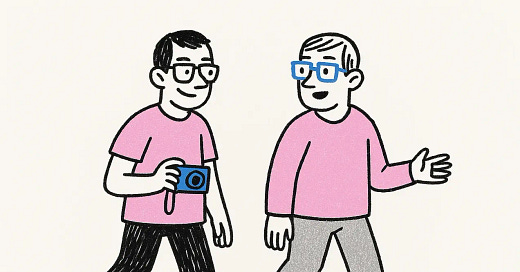Photog: Good Morning, Economist.
Econ: Good Morning, Photographer.
Photog: Tell me, what exactly is economics?
Econ: Do you think about enrolling in economics at university?
Photog: Absolutely not! Tell me.
Econ: Guess! How would you define economics?
Photog: Economics is what economists do.
Econ: Not bad. But too simple. You're shifting the question from the subject of scientific study to the people who deal with 'economics'. That doesn't make you much wiser. Try again.
Photog: Economics deals with the economy.
Econ: Not bad either. I suspect this definition is the most widely used. It has two disadvantages: First, it is not very clear. There is no clear demarcation from other scientific fields. Does the design of banknotes, for example, belong to economics? Second, and more important to me, this definition is too narrow. Economics also deals with political, legal, cultural, and psychological issues. Not only the economy.
Photog: The economist as scientific imperialist.
Econ: The British economist Lionel Robbins wrote the following definition about 100 years ago: 'Economics is the science which studies human behaviour as a relationship between ends and scarce means which have alternative uses.'
Photog: Couldn't it be a bit more concise?
Econ: The advantage of Robbins’s definition is that economics is no longer concerned with a specific subject matter but instead describes science as a selective problem. This makes it easy to distinguish between different scientific disciplines. The discipline of Economics deals with issues of scarcity that need to be solved. For example, the question of which market rules are necessary to ensure that there are no shortages in the supply of goods such as bread, cars or insurance.
Photog: Sounds boring.
Econ: To be honest, I don't like it either. Because it doesn't focus on human beings. Not on the craftsman but on his tools. People then wonder why the tools have their own interests and why they develop strategies.
Photog: We've now had three definitions of economics that you don't like. Is there one that suits you?
Econ: This one: 'Economics deals with the possibilities and problems of social cooperation for mutual benefit.'
Photog: Why do you like this particular definition of economics?
Econ: Firstly, because it puts people at the centre. Secondly, it explores how human coexistence can succeed. If the core of democracy is that people can pursue their desires, then, by this definition, economics is the central science for answering the question of how this individual pursuit of happiness can succeed in a world where we don't live alone on an island but together with others, where the desires of one person are often only made possible by others. Or where, at times, one's desires clash with those of others.
Photog: And what answers does economics have to this question?
Econ: In short, economics seeks interactions that are mutually beneficial to the actors, or rather, rules that enable such positive actions. The social philosopher John Rawls put it this way: society, at its best, is 'an enterprise of cooperation for mutual benefit.'
Photog: Economics as a means to strengthen democracy?
Econ: That's how I understand and use economics. Economics seeks ways to enable all people to follow their desires. Economics as an enabler of democracy.
Photog: I like that. See you in Democracy, Economist.
Econ: See you in Democracy, Photographer.





Very good!!!
Interesting and I Iove the dialogue :) Almost Socratean
If you are interested in democracy you might like the interview I did with Prof Cartledge which is on my Substack
https://open.substack.com/pub/joannamilne?r=3j9y88&utm_medium=ios